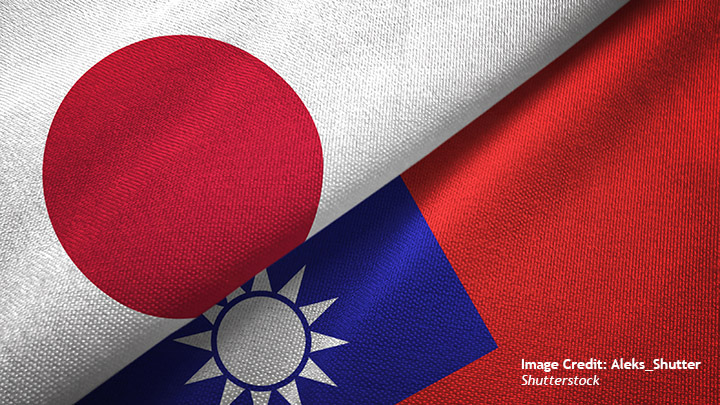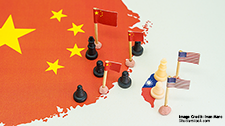Taiwan: Tokyo’s New Ally?

Jagannath Panda
In December 2022, the back-to-back visits by senior Japanese lawmakers, Koichi Hagiuda, Japan’s ruling Liberal Democratic Party (LDP) Policy Research Council chairman, and Hiroshige Seko, the upper house secretary general of the LDP, consolidated the narrative surrounding Japan’s accelerated strategic and diplomatic shift in its Taiwan stance. Hagiuda’s trip was the first by an LDP key official in 19 years. Earlier in July 2022, another high-level delegation led by former Defense Minister Shigeru Ishiba held talks with Taiwanese officials on regional security issues in order to prepare for and prevent escalation of any potential conflict in the Taiwan Strait and beyond.
Such recent high-profile visits are therefore historic in that they have disrupted the years of deference to not cross China’s “red line” on Taiwan – time and again reiterated as a “core interest” and an “inalienable” part of the People’s Republic of China’s territory (mandated by the one-China principle). Beijing has expectedly criticized the visits as a violation of “Japan’s commitment on the Taiwan issue” and an “irrational move to undermine stability in Straits.”
This disruption in Japan’s long-standing non-confrontational China diplomacy becomes more significant as these LDP leaders were close associates of the recently assassinated former Prime Minister Shinzo Abe – a vocal supporter of Taiwan (widely seen as a China hawk) and stronger Japan-Taiwan ties. Abe’s oft-quoted remarks linking a Taiwan contingency with Japan’s security interests have never seemed more prophetic for Japan’s security policy, which has decidedly changed course.
Defending Taiwan: No longer Anathema?
Although Japan’s tilt toward stepping up the rhetoric, if not as yet wholly embracing, the contentious Taiwan issue has been written on the wall for some time, 2021 with the US-Japan joint statement in April and the defence white paper in July truly set in motion Japan’s intent to include the Taiwan Strait’s “sense of crisis” in its official policy. This interlinking of security interests was clearly articulated by the Taiwanese President Tsai Ing-wen – who has pledged to deepen security cooperation between Taiwan and Japan, among other “like-minded” democracies, to safeguard regional security – when she stated that “on the issue of strategic safety Taiwan is a very critical line of defense of the first island chain.” For Japan, unilateral attempts to change the status quo by China in the Taiwan Strait thus provide the impetus to not just defend the neighboring Japanese territory but also undertake responsibility for the stability of the entire Indo-Pacific region.
Post the (controversial) Taiwan visit by the US House Speaker Nancy Pelosi in August 2022, the increase in Cross-Strait and Sino-Japanese tensions have furthered Japan’s resolve to strengthen deterrence, including tightening of ties with Taiwan. As a retaliation to the Pelosi visit, China not only conducted live-fire military drills that surrounded Taiwan, besides economic coercion and cyberattacks on Taiwanese infrastructure, but also fired multiple ballistic missiles that landed within Japan’s exclusive economic zone (EEZ).
Although China regularly conducts military drills in locations around Taiwan that overlap with or are very close to Japanese territory, the post-Pelosi “strike drills” against Taiwan that involved aircraft crossing the median line of the Taiwan Strait and into the island’s air defense identification zone have heightened the fear of a Taiwan contingency and the ensuing impact on Japan’s security. Moreover, China has in recent months upped its naval and air force presence near Japanese territories.
The highly fragile global geopolitics resulting from a breakdown in international solidarity due to Russia’s war in Ukraine – particularly China’s continuing support to Russia and Xi Jinping’s re-coronation in the Mao Zedong mold post the 20th National Congress of the Communist Party of China (CPC) – has only made matters worse. Against this scenario, Japan is naturally stepping up its defense posture in addition to strengthening and expanding the scope of its security alliance with the US.
However, Japan’s strategic alignment on Taiwan is a direct result of its national security concerns and not just a corollary of the evolving US strategic position on Taiwan. The latter certainly lends weight to Japan’s fear. Therefore, even as questions whether the US should maintain “strategic ambiguity” or turn to “clarity” are being debated, Japan despite being security dependent on the US seems to be looking at developing strategic self-reliance and deterrence capabilities, and not just piggy-backing on the US support.
Consolidating “Unofficial” Engagement
The recent upsurge in diplomatic activity notwithstanding, it is important to note that Japan and Taiwan do not have formal diplomatic ties: 2022 saw the 50th anniversary of the termination of diplomatic relations due to Japan’s normalization of relations with China. However, Japan’s top envoy to Taiwan recently praised the “best-ever” Tokyo-Taipei relations, and labelled them as “irreplaceable partners.” Their partnership has become immensely critical for both sides as they navigate worries that Xi Jinping’s dream for reunification is now not only highly probable given his remarks at the 20th CPC National Congress, but may also have been accelerated. Fueling these concerns are factors like the Ukraine War, deteriorating domestic situation in China post the pandemic, and the trade war with the US. Moreover, Tokyo now intends to undertake the Taiwan issue as a greater strategic priority as the US is overstretched and preoccupied with Ukraine, and so Japan cannot continue to rely on Washington to take care of Taiwan alone.
Nobuo Kishi, former Japanese minister of defense, in line with Abe’s sentiment, stated in 2021 that the “peace and stability of Japan is directly connected with Taiwan.” Thus, Tokyo is inclined to defend Taiwan to protect important sea lines for energy and trade in the Taiwan Strait, and to avoid the island falling under Chinese control, which would have implications for Japan’s military, political, economic, and even domestic policies, along with a possibility of losing territory. In addition to China, which has replaced North Korea as the perceived number one threat to Japan, Taipei and Tokyo share common interests in rebuilding after the pandemic and strengthening supply chain resilience.
In mid-December 2022, Japan’s New National Security Strategy, Defense Strategy, and Defense Buildup Program were released to safeguard Japan’s national interests “in the midst of the most severe and complex security environment since the end of World War II.” Notably, the new security policy shift proclaimed an increase in defense spending, cooperation with like-minded partners for maintaining its free and open Indo-Pacific (FOIP) vision, and a move away from the traditional defense-orientated policy to an offensive posture through acquiring counterstrike missile capabilities. China was deemed the “biggest strategic challenge for Japan.” Importantly, the three documents indicate how seriously Tokyo is taking a contingency over Taiwan by strengthening Japan’s military capabilities and reiterating that Japan will proactively maintain peace and stability in the Taiwan Strait and will not tolerate unilateral forces changing the status quo.
Days after Japan’s new strategies were revised, Taiwan also released new plans for strengthening self-defense capabilities, including expanding mandatory conscription to one year, and reconfiguring the military’s structure. Taking note of the upgrades in military strategy in Japan, largely due to the threat from China’s military buildup and North Korea’s resurgent nuclear program, President Tsai would not only seek to deepen security cooperation including intelligence sharing but also anticipate that Japan’s position on Taiwan emergency is not all talk given the geographical proximity of the Okinawa Prefecture to Taiwan.
Beyond security issues, the lack of formal diplomatic ties and officially only working-level “non-governmental” relationship have not inhibited the development of democratic Taiwan as “an extremely crucial partner and friend,” with which Japan shares fundamental values. Mostly, instead of active officials, cooperation has occurred through informal channels such as retired officers or members of the National Diet, which China has been largely willing to overlook. Importantly, these have proved effective methods of generating strong relations and achieving key goals such as sharing expertise and assistance on mutual concerns. For example, the Global Cooperation and Training Framework, established with the US, is connecting experts between Japan, Taiwan, and the US.
Furthermore, the Japan-Taiwan Exchange Association (JTEA; formerly, the Interchange Association) and the Taiwan-Japan Relations Association (TJRA; formerly, the Association of East Asian Relations), the Taiwanese counterpart of the JTEA, commemorated 50 years of their foundation last year. Both JTEA and TJRA have been actively involved in helping diversify bilateral cooperation mechanisms, as well as increasing Japan-Taiwan parliamentary diplomacy.
In the international arena, too, there is strong Japanese governmental support for Taiwan, such as through providing vaccines and backing Taiwan to join the Comprehensive and Progressive Agreement for Trans-Pacific Partnership (CPTPP). There is also strong Japanese public support, which has been exemplified through acts of solidarity such as the Japanese consumers voluntarily purchasing Taiwanese pineapples after they were sanctioned by China. Japan has now become a leading export destination for Taiwan’s pineapples, signifying how even simple acts of support can be a viable tool for countering (Chinese) economic coercion.
Formalizing of Security Cooperation or Anti-China Leverage?
In Japan, recent surveys have highlighted the worsening public image of China: about 90 percent of Japanese viewed China unfavorably. Moreover, the rise of anti-China hardliners in Japanese politics in tandem with growing pro-Taiwan sentiment has allowed the scope of cooperation to expand, which could potentially include a limited military or credible security tie-up. However, a formal military pact between the two is unlikely because of the lack of diplomatic ties; without the precedent of a legal basis, Japan’s conservative bureaucracy, no matter how nationalist Japanese political environment appears at present, will not push for radical measures. Thus, viable ways to pursue legal mechanisms that can help prepare for contingencies are imperative.
In the recent past, there have been calls for a Japanese version of the US Taiwan Relations Act, which allows Taiwan security guarantees, among other “longstanding commitments,” in order to formalize channels for security dialogue and cooperation. Yet there is little to suggest that such an action will happen in the immediate future.
Japan’s aversion to completely endanger ties with China is still a relevant detail: China’s wrath amid the already volatile situation in East Asia is just not worth the trouble at this point. In the past Japan’s hedging with China and the US due to uncertainty in ties disallowed sustained growth in diplomacy with Taiwan. However, the democratic alignment in hardline approach toward China especially post the Ukraine war has emboldened Japan to pursue Taiwan as a definitive leverage. The G7 statement after Pelosi’s Taiwan visit and the US’s official lauding of Japan’s new defense policy shift are evidence of a closely aligned US-Japan stance.
Importantly, the lackluster meeting between Prime Minister Fumio Kishida and President Xi in November 2022 produced no definitive outcome; and the regional and bilateral tensions have refused to abate. China is certainly aggravated by Japan’s new attitude: be it Taiwan’s Vice-President William Lai attending Abe’s funeral, Japan’s push to coalesce Indo-Pacific partnerships with (likeminded) states like India and Australia, or Japan revising its strategic documents.
Hence, Tokyo would be mindful that any further Japan-Taiwan bonhomie will be under close Chinese scrutiny and will have drastic implications for Japan. Yet, Japan as a growing global power seems on course to not just embrace the internationalization of the Taiwan question but also defend its national and regional security interests.
This article was written in January 2023 and is translated to Spanish and published as a part of the special issue on Taiwan in a monographic quarterly Vanguardia Dossier, no. 87, April-June 2023.
Related Publications
-
Needed, a Framework to Protect Undersea Cables
In the data-driven world we live in, submarine cables are the arteries that connect nation-states and their people in literally every human activity, including trade, commerce, entertainment, and social interactions. […]
-
The Future of the ADMM-Plus in the Indo-Pacific
Since its establishment, the ADMM-Plus has evolved into a valuable component of the regional security architecture. It facilitates not only dialogue among the region’s defense ministers and officials, but also […]
-
India-Japan-Philippines: A Strategic Maritime Trilateral or More?
Regional states like India, Japan, and the Philippines have been seeking cooperative solutions with other middle powers that can both counter the Chinese influence and fulfill other economic as well […]
-
Understanding EU Relations with China and Taiwan in the Indo-Pacific: An Interview with Dr. Zsuzsa Anna Ferenczy
In the context of growing tension in Cross-Strait relations and rethinking European strategies in the Indo-Pacific post-COVID-19, ISDP intern Foster Cunliffe sat down with Dr. Zsusza Ferenczy to shed light […]
-
Taiwan-PRC Crisis: What Cross-Strait Conflict Could Cost Europe
The escalating tensions between Taiwan and China pose significant economic and strategic challenges to the European Union, such as the inaccessibility of Taiwanese inputs, market, and capital. This issue brief […]




